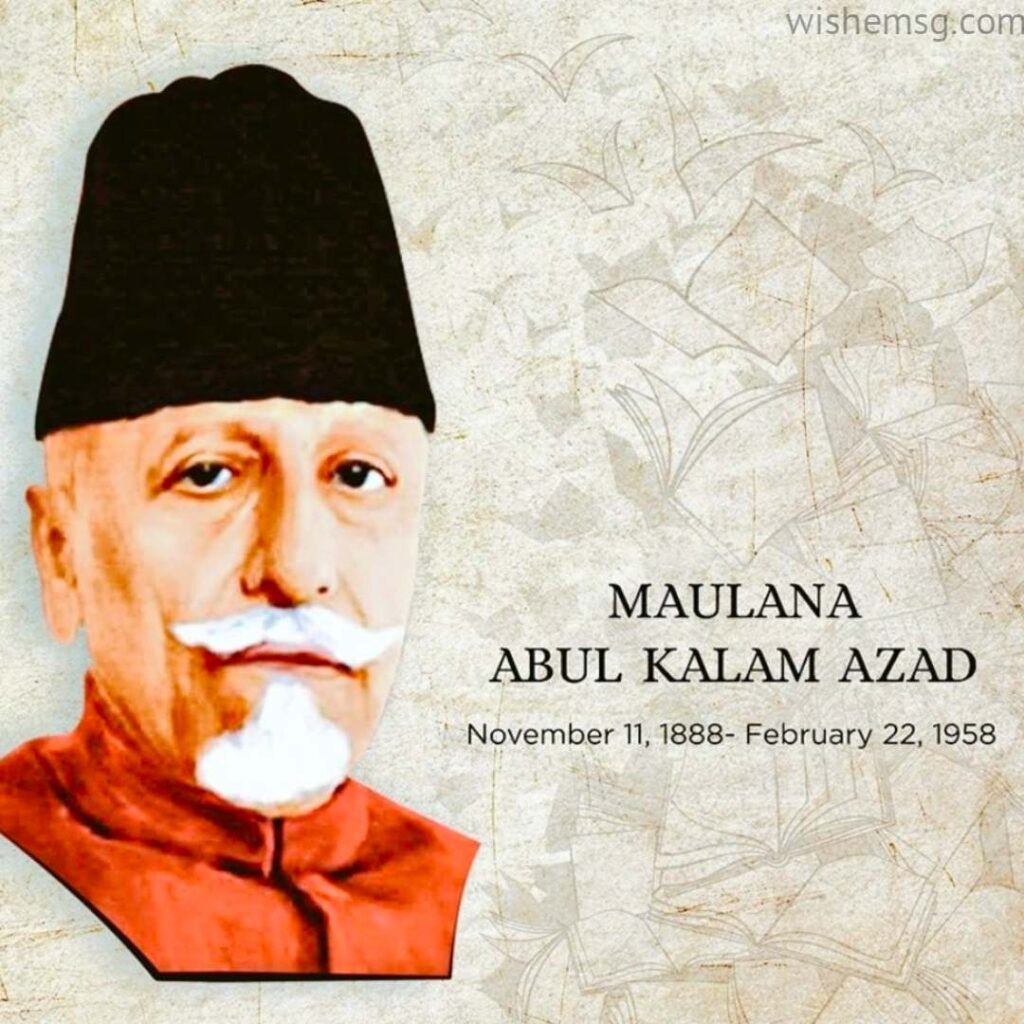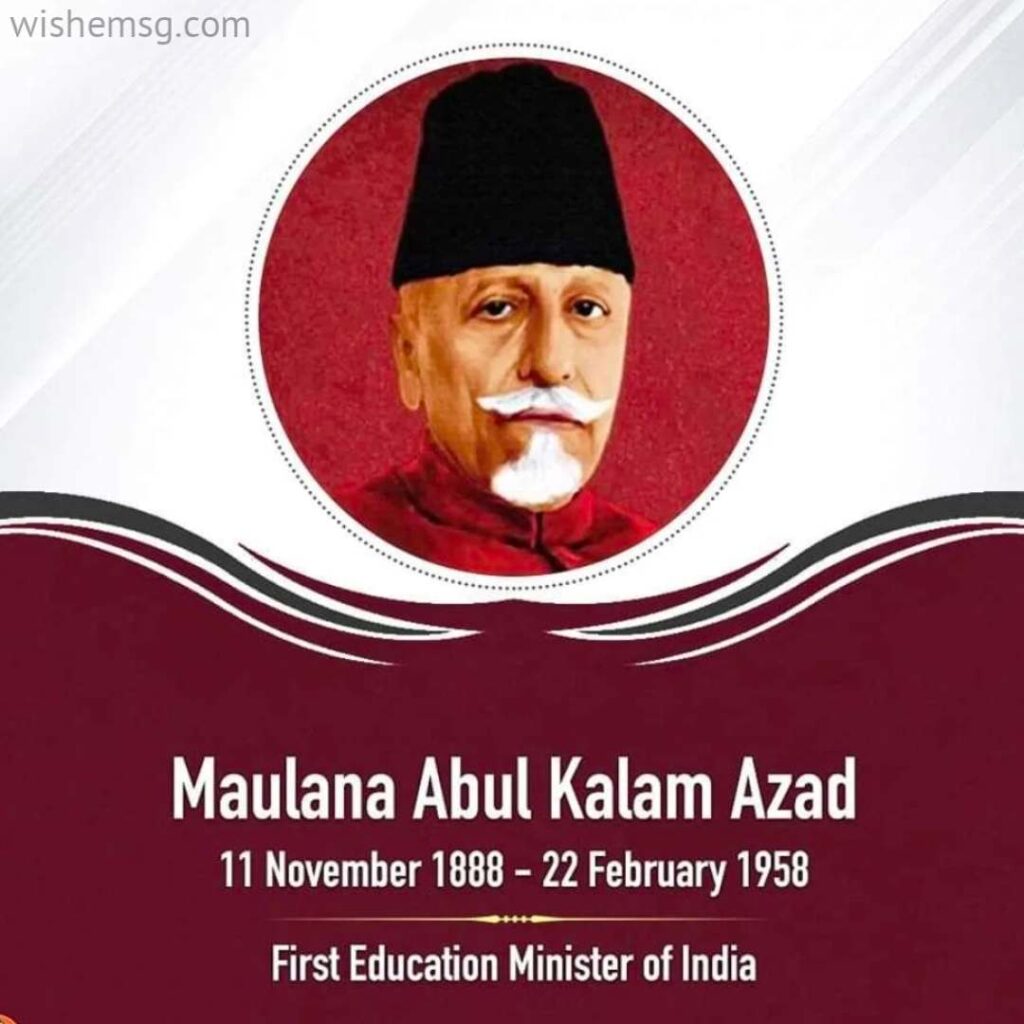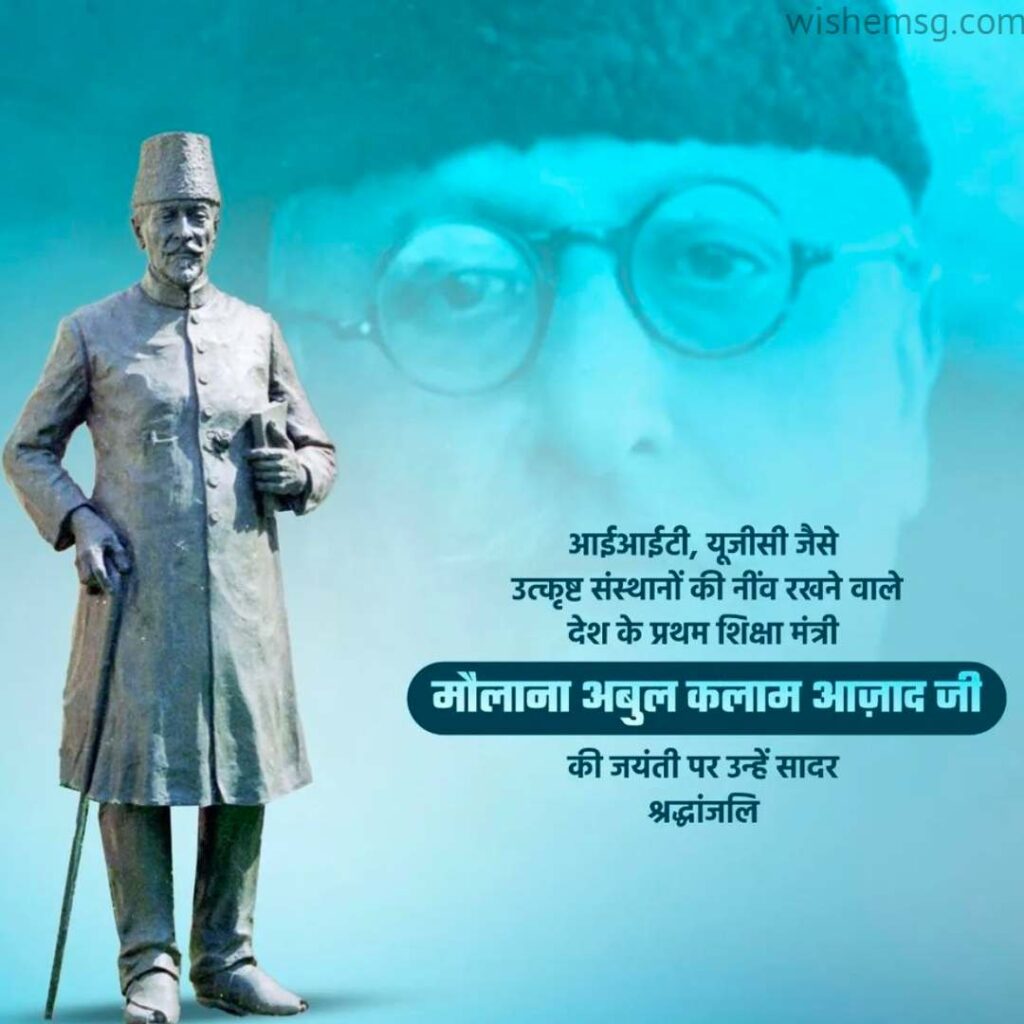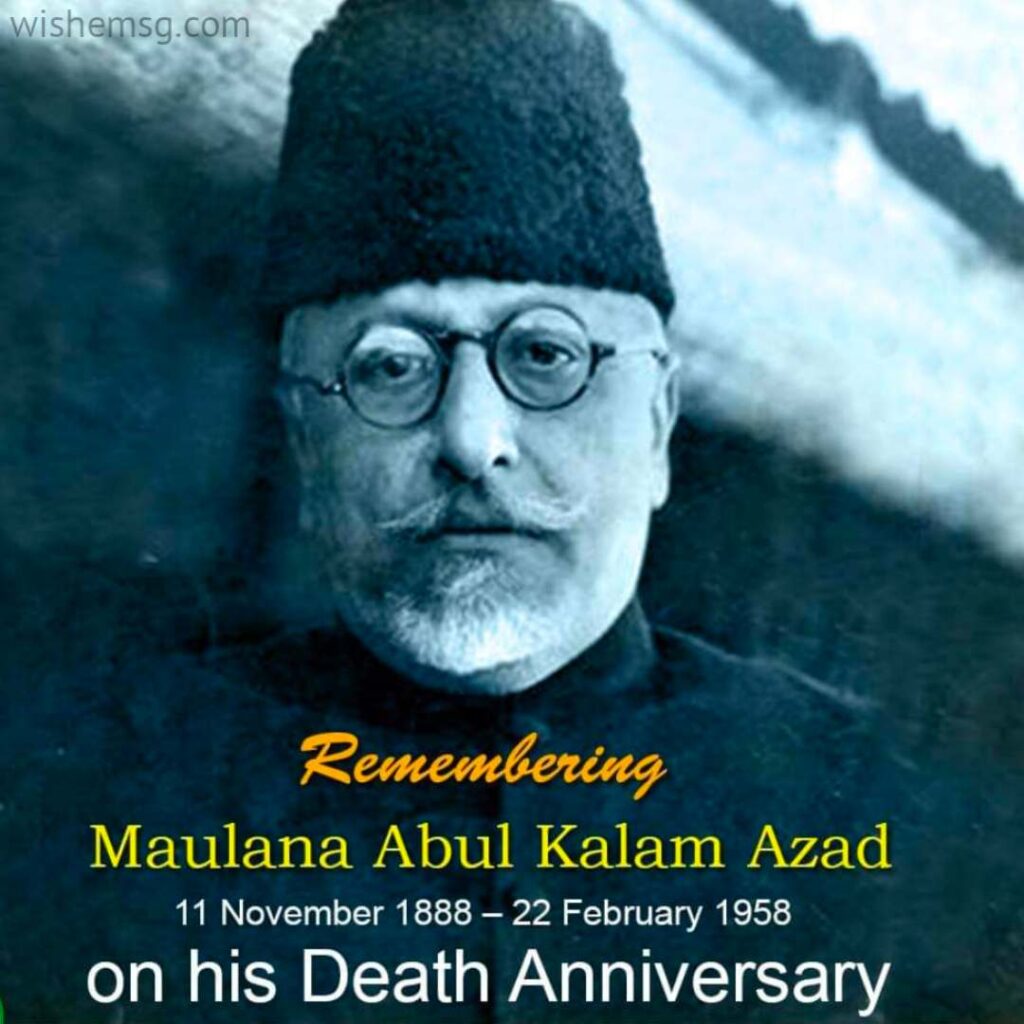Maulana Abul Kalam Azad Death anniversary Abul Kalam Muhiyuddin Ahmed Azad was an Indian nationalist who engineered the inclusion of Muslims in the freedom struggle and even brought states of North India to join the cause.
Maulana Abul Kalam Azad Death anniversary
Educationists should build the capacities of the spirit of inquiry, creativity, entrepreneurial and moral leadership among students and become their role model.”
“We must not for a moment forget, it is a birthright of every individual to receive at least the basic education without which he cannot fully discharge his duties as a citizen.”
Climbing to the top demands strength, whether it is to the top of Mount Everest or to the top of your career.”
The 40th Jawaharlal Nehru National Science, Mathematics and Environment Exhibition for Children – 2013, which has been organised on this occasion seeks to encourage, popularize and inculcate a scientific temper among the children of the country. I am glad to learn that NCERT organizes national level science exhibitions every year where children showcase their talents in science and mathematics and their applications in different areas related with our everyday life.
We must not for a moment forget, it is a birthright of every individual to receive at least the basic education without which he cannot fully discharge his duties as a citizen.”

“One who is not moved by music is unsound of mind and intemperate; is far from spirituality and is denser than birds and beasts because everyone is affected by melodious sounds.”
“Educationists should build the capacities of the spirit of inquiry, creativity, entrepreneurial and moral leadership among students and become their role model.”
“Climbing to the top demands strength, whether it is to the top of Mount Everest or to the top of your career.”
No program of national education can be appropriate if it does not give full consideration to the education and advancement of one-half of the society that is the women.”
“Art is the education of emotions and is thus an essential element in any scheme of truly national education. Education, whether at the secondary or at the university stage, cannot be regarded as complete if it does not train our faculties to the perception of beauty.”
Maulana Abul Kalam Azad Death anniversary Wishes
The central theme of this year’s exhibition, “Science and Society”, is an occasion for us to reflect on the issues and problems our society is facing. On the one hand, we face challenges regarding conservation of our resources for future needs and on the other, the fulfilment of basic necessities of the ever increasing population continues to remain a persisting problem. It is high time, we redefine the concept of development in a wider perspective, and try to find innovative ways based on scientific knowledge and mathematical understanding to tackle them. There should be no confrontation between the environment considerations and development requirements.
Innovation will be a determining factor of growth in the future. In a world marked by resource constraints, growth will increasingly depend on technology up-gradation. India has dedicated 2010-20 as the Decade of Innovation. The Science, Technology and Innovation Policy, unveiled this year, calls for mentoring grassroots innovation. Innovation in science and technology can lead to the development of new products and processes which could act as catalysts for growth. Therefore, Research & Innovation needs to play a vital role in our education system. Further, our drive towards innovation should benefit those at the bottom of the socio-economic pyramid.
My vision is that India should become a knowledge power in the coming decade wherein every Indian is literate and has access to affordable, quality education. I am sure the visionary perspectives of Maulana Azad will continue to inspire and guide us to build a knowledge society.

I would once again like to thank the NCERT, New Delhi and the Government of Sikkim for inviting me to this exhibition. Panditji had once observed and I quote: “Who indeed could afford to ignore science today? At every turn we have to seek its aid… The future belongs to science and those who make friends with science”. (Unquote). I hope, young children that you continue to take inspiration from these eternally relevant words of Pandit Nehru. Remember that Science, Technology and Innovation is the key to progress and prosperity for our nation. Always move forward with an open mind and strive to reach new heights. I offer my best wishes to you for a bright and productive future.
“The foundation of India’s progress is not mere political freedom, but the living faith that it is the birthright of every individual.”
Education is a matter of life and death for our nation. The spread of education is the best insurance for the safety of our nation.”
“The aim of education should be to teach us rather how to think, than what to think – rather to improve our minds, so as to enable us to think for ourselves, than to load the memory with thoughts of other men.”
A man of letters, he wrote under the pen name of Azad. He founded several journals in Urdu with the aim of promoting nationalism in Muslims and unify the two communities.
About Maulana Abul Kalam Azad
As a part of his traditional upbringing, he was taught religious texts which morphed him into a nationalist revolutionary. A prodigy, Maulana Azad was composing poetry in Urdu from a very tender age. His works criticized the British Rule and implored many to participate in the fight for independence.
His political prowess was proved when he was nominated as the President of the Indian National Congress. He was only 35 at the time he assumed the Presidency of the country’s largest political party.
He was one of the most prominent faces who opposed the partition as he had always dreamt of one unified nation for India and Pakistan.
11 November, the birthday of independent India’s first education minister, Maulana Abul Kalam Azad, is observed as National Education Day in the country.
“Be more dedicated to making solid achievements than in running after swift but synthetic happiness.”
“The poison of dogmatism and intolerance drags nations down to the depths of degradation and oblivion.”
Education makes a society, give everyone a dignity.

It is education; that enables a person to serve his nation.
The society will have strong root, if it educates its youth.
It is education, which serves best to every generation.
Population, unemployment or pollution, Education is all problem’s solution.
Education is a best tool, creates difference between wise and fool.
“The story of India’s freedom struggle is not just a story of great leaders and their movements, but it is also a story of millions of ordinary men and women who fought for their rights and their dignity.”
“Educationists should build the capacities of the spirit of inquiry, creativity, entrepreneurial and moral leadership among students and become their role model.”
“Education imparted by heart can bring revolution in the society.”
“I am part of the indivisible unity that is Indian nationality.”
“To succeed in your mission, you must have single-minded devotion to your goal.”
First Education minister of Indian
“Climbing to the top demands strength, whether it is to the top of Mount Everest or to the top of your career.”
“You have to dream before your dreams can come true.”
To commemorate the contributions of Azad towards education and nation-building, Pratibha Patil, the then President of India, announced November 11 as National Education Day at Vigyan Bhavan in Delhi in 2008.
Maulana Abul Kalam Azad served as the Education Minister of India from August 15, 1947, till February 2, 1958. He was a freedom fighter, scholar, and educationist who established some important institutions in the country.
Maulana Azad was one of the key founding members of the Jamia Millia Islamia. Influenced by Mahatma Gandhi’s philosophy, Azad, along with Mukhtar Ahmed Ansari, Hakim Ajmal Khan and others established Jamia Millia Islamia in Aligarh, which was later shifted to Delhi.
He also set up the apex educational bodies such as the All India Council for Technical Education (AICTE) and the University Grants Commission (UGC).
Azad was also responsible for setting up the Council of Scientific and Industrial Research (CSIR), Indian Council for Cultural Relations (ICCR), Sahitya Academy, Lalita Kala Academy, and Sangeet Natak Academy.
On the occasion of National Education Day 2024, Prime Minister Narendra Modi, Vice President M Venkaiah Naidu, Congress senior leader Shashi Tharoor paid their tribute to the great leader.

“Be more dedicated to making solid achievements than in running after swift but synthetic happiness.”
It’s so very important to respect the process that goes behind success. The sweat and blood, the discipline, the perseverance against all the odds, the investment of one’s time in gathering knowledge on a subject and the sacrifice of one’s pleasurable activities in favour of one’s goals.
So many people get carried away by the glamour and the “look” of success. They want it. They want to live that life as would be defined by that particular success.
The process is mandatory, a must-have, the foundation before we can taste success. It must be enjoyed, worshipped and managed with tremendous care.
If you want to lose weight, build muscles, become a successful writer or an entreprenuer, you have to break them down into daily tasks/rituals and vehemently stick to them till those rituals become a habit which will finally allow you to achieve your goals.
Now, this is interesting. It is not just forming a habit around one area of activity. It has to permeate in almost every area of our lives. Discipline is key.
For example, I want to write 100 words every day so that it becomes a habit towards my writing goals. But I can’t achieve that unless I wake up early because I have my day-job to do, in the evenings I have to do my exercise and then I have to spend time with my family etc. If I miss to get up early, I will miss on my writing ritual or I may have to sacrifice my exercising ritual to give way for writing.
Maulana Abul Kalam Azad served as the first education minister of independent India from August 15, 1947, to February 2, 1958. He was also a freedom fighter, a scholar and a senior political leader.
Many countries celebrate World Education Day on January 24. On December 3, 2018, the United Nations General Assembly adopted a resolution proclaiming January 24 as International Day of Education, in celebration of the role of education for bringing global peace and sustainable development.

